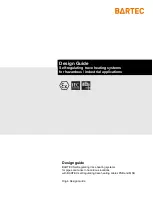
10
10
3.) Usage
The components of a complete system must never be used
individually or be replaced by non-certified products. The fall
arrester must always be used with the supplied rope.
The system should only be used in accordance with its intended
use. The guided fall arrester must always be attached to an
attachment point marked as "A” on the body harness (EN 361)
(3.1 – 3.3).
During use, pay particular attention to sharp edges, the cable guide
and other things that could damage the rope
or the fall arrester (3.6).
Also ensure that all carabiners (EN 362) are firmly locked (4.4).
Flexible anchor lines must be fastened to a suitable attachment
point (minimum load capacity of 12 kN, e.g. in accordance with
EN 795, DIBt, ANSI, etc.). For horizontal use, the fall arrester must
be guided by hand in order to adjust the length.
In the event of a fall from a height, the fall arrester locks the rope.
With guided fall arresters without shock absorbers, the fall arrest
force is reduced below the maximum permissible 6 kN (EN) via
friction and rope elongation ε (3.4). With fall arresters with shock
absorbers, the same is achieved via the shock absorber (3.5).
The required fall clearance distance (HLi) is calculated from the
following values and must be respected at all times in order to
avoid impact with the ground in the event of a fall (3.4 – 3.6).
Particular care should be taken when using the equipment near
the ground:
max. possible deceleration
distance/arrest distance:
2x ℓ +1 m* / + 2.3 m**
+ height of the attachment point from the ground: x m
+ rope elongation
ɛ
:
max. 5%
+ Safety distance:
1 m
= required fall clearance distance
H
Li
in m
* for vertical use (3.4, 3.5)
** for horizontal use (3.6)
For safety reasons, a visual inspection (4.1 – 4.4) and a functional
check must always be carried out prior to use. In addition, guide the
fall arrest device up the rope and pull down quickly. It must move
freely above and immediately lock when it comes down.
To use, attach the carabiner on the flexible anchor line to a suitable
anchor point. Attach the carabiner on the lanyard/shock absorber of
the guided fall arrester to an attachment point on the body harness
(EN 361). Use of the front attachment point is recommended. Avoid
slack rope (pay attention, especially during the first metres of
climbing, until sufficient rope mass is available to keep the rope
independently on the ground) and make certain that there is always
sufficient free space under the user's feet to exclude the possibility










































